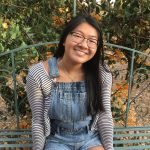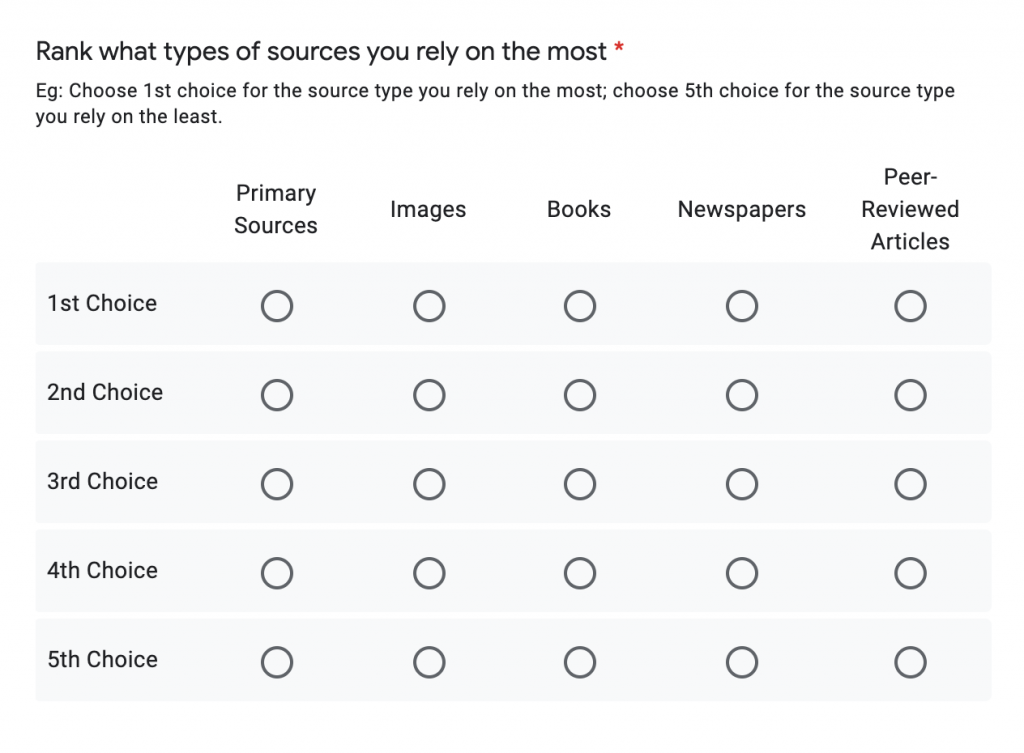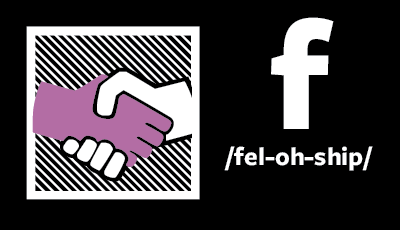Undergraduate Library Fellows
Three Mini Lessons from the Undergraduate Library Fellowship
 by Natalie Chu ’23
by Natalie Chu ’23
This semester has been full of unique emotional and physical hurdles. Navigating a world through remote settings and distanced learning provided us all with a diverse assortment of lessons and growing pains. For me, finding community, safe spaces, and support systems during the ongoing pandemic greatly helped in maintaining my mental health through direct dialogue and communication. The Undergraduate Library Fellowship is one of those communities that really adjusted and catered to impacted students. I thoroughly enjoyed our bi-weekly check-in’s with our mentors. As part of the Outreach Team, Keziah and I had Jen Brown and Annalise Phillips, who were so incredibly supportive and passionate about our work and personal development. Having this safe space for us to share, empathize, and uplift each other was an incredibly valuable part of this fellowship. Here are some mini-lessons that we learned and affirmed for each other:
1. There is no “right” time to have your life figured out.
Life continues after your undergraduate. There are many aspects of our lives that are still incredibly uncertain but there is no definite timeline to figure that out. Give yourself the opportunity (and grace) to continue exploring and learning about yourself and the world around you.
2. Prioritize your mental health and set boundaries in short-term and long-term planning.
Whether that is investing in some Girl Scout Cookies (thanks Annalise!) or taking 30-min walks outside, there is always more room for self-care. As challenging as the year has been, prioritizing your health will allow you to be more readily available to support others.
3. Shoot for the stars and recognize your accomplishments.
Set goals for yourself that will truly make you happy; following and fulfilling the expectations of others will only lead to a life of dissatisfaction. More importantly, we have reached so many milestones within our academic and personal lives—probably many more than we realized! So take the time to congratulate yourself on your perseverance and courage to take on these challenges!
As we all may have learned in this incredibly challenging year, practicing empathy has been an increasingly crucial life skill in remaining grounded in our values and humanity. Daily practices of direct communication and active listening are fundamental to a culture of empathy. Being able to navigate this school semester with an amazing support system like the ULF has truly made me feel both deeply connected, seen, and valued. For those of you who are lucky enough to experience this fellowship, you will truly make lifelong mentorships and community. Nevertheless, this fellowship has taught me countless lessons that I hope to carry with me and share with others.
Joseph Rodriguez – Fellowship Reflections

by Joseph Rodriguez ’21
As a graduating senior, I didn’t expect my final year to be online. I know I am not alone. The world was put on pause in 2020, but not all was awash. I had the opportunity to participate in the Library Fellows Program, and, although it was completely virtual, it was one of the highlights of my Berkeley experience.
Before the pandemic, when I was still on the Berkeley campus, I buried myself in libraries. My personal favorite is Morrison Library—that quiet, seemingly dead enclosed space which seems to transport one to another world. There is just something magical about Morrison. One finds themself ensconced in books, conversing with the living and the dead.
I was initially attracted to the Library Fellows Program because I had used the library quite frequently as an undergraduate. For me, and I suspect for most undergraduates at Berkeley, the library is just a quiet place with books, perhaps even a respite from the humming and bustling—the restless—activity of Berkeley’s campus. But my perspective here on the library was expanded after the Fellowship, providing me with a fresh set of eyes.
As part of the fellowship, I was tasked to work on a year-long project. My team and I spent the year working on a project to create a resource for students interested in research. I was drawn by the prospect of working on this project because of my own previous experience with research as an undergraduate. We set ourselves a humble task: to compile a list of sources to help students navigate the byzantine network of Berkeley’s library system. Little did we know that this would be no easy task.
We devoted weeks brainstorming, at times very confused. The most illuminating aspect of the project was spending these weeks mulling over the precise wording of our survey questions. Words are, after all, important; and this fact was especially revealed to me toward the end of the fellowship, when we finally sent out the survey after having worked on what seemed like aeons crafting and perfecting our questions.
One activity that I was particularly struck by during the fellowship was the empathy-mapping activity. The most important task for any problem-solving process, I learned, was empathy. Empathy here is understood as a way of relating to the audience one has in mind. To empathize is to see what challenges face our undergraduate student population, especially those who are interested in research. We asked questions such as:
What is the learning challenge? Who are the learners? What are their goals?
Applying this empathy-minded approach throughout the year meant that the design thinking process was dynamic. Indeed, the design thinking process involves not just students and library technicians, but also the larger campus community at large. We can find this approach reflected almost anywhere we look: a public bench that restricts who can and cannot sit on it; a crosswalk that connects one street to another; a park that invites both children and parents to play.
Seeing these places in this way, however, requires a certain amount of reflection—these are subtle design values that remain largely concealed to us. The Library Fellows Program helped me to cultivate that reflection, and I am certain that I will employ these new sets of tools in the future, whether in academia or when walking around my neighborhood.
Iteration and Intention Within the Library
by Katherine Chen ’23
Last year around this time I wrote a blog post about my experiences with the library and what I learned as a first year at Cal. Now, I’m writing a blog post about what I learned as an Undergraduate Library Fellow, all from my bedroom.
I applied to the Undergraduate Library Fellowship during the end of my first year at Cal because I wanted to not only learn more about library resources and design, I also wanted to share them with my peers and better understand how my peers viewed the library. The peer to peer activities and workshops my ULF cohort did together showed me that library resources are not accessible to everyone, with one activity in particular standing out to me. We were given a task to find a resource through the library website using whatever means we could think of, I volunteered to go first and had a time limit of five minutes. Unfortunately, I spent those entire five minutes going in circles; I could not figure out how to navigate the website to find the resource and I just became more confused and discouraged the longer I tried. Whether it be because of faulty design or just because students were not aware of such resources, students were not taking full advantage of all the amazing resources the library had to offer. From the thousands of databases offered, subject librarians who you can meet with to help with your research and assignments, to gaining access to research articles found on Google Scholar— the library offers so much but students were not utilizing them.
Once I learned more, I quickly wanted to share everything with everyone, but I realized I could not just start there. As a cohort, we learned to approach the design process with empathy, remembering that the aim is to help people, not just solve problems. Thus, I first had to learn where students had these gaps in library resources and student awareness in order to help them.
With my affinity group, we worked to craft a survey aiming to learn about people’s research methods and practices when they use Berkeley library services. With this, we hoped to understand the gaps in research knowledge and how to help students overcome those gaps. Crafting the survey, however, was not a walk in the park.
Brainstorming questions came relatively easy— it was creating the questions with intention while also designing them with the back end in mind that was not so easy. We went through several iterations of the survey and scrapped many questions throughout because we realized they were either not conducive to our intentions with the survey, or the question would not give us information to learn from. One question in particular was very tricky: what types of resources users rely on the most. This question went through at least three different phases. The first iteration of the question had issues because the potential answers would not tell us where the gaps in research were. The second iteration used jargon that most students would not understand, and the third iteration was too long of a question to ask. Ultimately, we refined the question to what it is today (pictured below) with the help of the wonderful mentors, but the journey was not easy.

Through this process and with the help of the mentors and my affinity group, I learned about the importance of iteration and intention. If a project is important, you will not work on it once then call it done. It will require your prolonged attention and energy, and with that comes constant refinement. As you refine your project, you have to remember the intentions of it— in fact, that is a guiding principle of the iterative process. What are your goals with this project and how is the project leading you towards accomplishing those goals? This question helped me frame my approach to the project and became a guide that I turned to whenever I needed aid.
My time as a fellow has been incredibly rewarding. Not only have I met wonderful people (special shoutout to my mentors Kristina, Nicole, and Kiyoko!) and learned more about the library resources, I learned about new ways of thinking that I will bring along with me wherever I go.
Stephanie Reyna – Fellowship Reflections
My name is Stephanie Reyna (she/her/hers) and I graduated from UC Berkeley in the Spring of
2020. I double majored in English and Anthropology and one of my most cherished experiences
as an undergrad was being a Library Fellow.
I applied to be a Library Fellow my Junior year in hopes that as a Senior, I would be able to
make a difference in the undergraduate community. When I read through the fellowship
description, I knew that it would be the perfect opportunity for me to carry out my research
project. I knew that I wanted to make a resourceful guide that would be available to the English
Undergraduate community; a guide that could be used not only by English majors but by
anyone writing a paper and needing guidance with citations.
The first semester of my fellowship consisted of further developing my research skills and
navigating the wealth of information the library has to offer. My relationship with the library and
my understanding of what a library does completely changed. I learned about the various
databases that are accessible and how much information is actually available to students.
Learning about databases such as Kanopy, OED, and having access to the full Chicago Style
Manual would have been extremely useful in the beginning of my undergraduate career. I know
many students do not know the types of resources that are available and as a fellow, students’
have a unique opportunity to learn about librarianship and help bring awareness to the
undergraduate community.
With the help of my mentor, Gisele Tanasse, the Film and Media Services Librarian, I created a
survey that was sent out by the English Department Advisor, Katie Schramm, to all the declared
English majors. From this survey, I learned that the majority of students preferred a Library
Guide on MLA format, footnotes, works cited, Chicago Style, and APA. As an English major, I
knew that the majority of students write their papers in MLA format, therefore, the main focus
was kept on MLA but I included links to Chicago style and APA.
The second semester of the fellowship, I focused on collecting the best resources possible and
designing the guide. I wanted to make the guide as visually appealing and digestible as possible.
I created examples drawing from my own academic papers and used images from Unsplash. I
created this guide in the hopes of bridging a gap I saw within the English undergraduate
community.
Moreover, the fellowship had team building exercises and I was surrounded by brilliant students
and librarians who mentored and supported our ideas until they were realized. By the end of my
fellowship, I was completely inspired by librarianship, so much so that I plan to pursue a career
as a librarian. This fellowship not only helped me make a difference but it has inspired me to
continue on the path of public service. I hope that the next cohort of Library Fellows have as an
enriching experience as I did.
Andy Chen – Fellowship Reflections
Hi! My name is Andy Chen (he/him)—welcome to the blog! I am a rising bioengineering and mathematics junior that is excited to reflect upon my experience serving as a Library Fellow as the new cohort is welcomed to the community.
As a future STEM educator that has always been impassioned about teaching, educational policy, and outreach, I arrived at UC Berkeley determined to make a difference in the learning community. From volunteering as a health educator with Peer Health Exchange to working for the Department of Mathematics as an undergraduate student instructor, I was thrilled to engage in the learning process directly. Working face-to-face with students and delivering course content to my classes reinforced my interest in teaching and mentorship.
When I first learned about the Undergraduate Library Fellows program, I immediately knew that I wanted to apply. The program aims to promote peer-to-peer learning and foster the connection between the UC Berkeley library system and the undergraduate student body—initiatives that I was interested in learning more about and how I could make a difference in the Berkeley community.
Under the mentorship of Kristina Bush, the Digital Literacies Librarian here at Cal, I undertook a project constructing a Library Guide for History C184D: Human Contexts and Ethics of Data Science. This is a course intended for data science majors and aims to give students training in making ethical decisions when working with big data by studying the complexity of human choices and social structures. As a student that has taken the course before and is interested in education, the project was a great opportunity for me to promote data science education in an increasingly datafied society.
During the year, I met with the instructors and course designers to learn more about the resources that they wanted to provide to their students. Particularly, a core element of the C184D course is a final vignette project, where students are allowed to research and expand on an ethical dilemma in data science. For example, recent controversies over Facebook’s use of personal data, self-driving cars, and smart homes were the kinds of topics that students could potentially look into. As a Library Fellow, my goal for the Library Guide was to organize and consolidate the resources that were already contained in the course—research journals, papers, and news articles—and create a new hub on the site for students in various stages of the research process.
Titled “Research Tutorial,” we focused on creating content for four stages of the research process: planning, discovery, analysis, and writing. With Kristina’s help, I was able to pose guiding questions to students looking for a topic, link out to library databases, offer systematic advice to evaluate credibility of sources, and direct students to writing resources.
Creating and developing this Library Guide really changed my relationship with the Berkeley Library as I helped to engage students with the wealth of resources that the university has to offer. In many cases, undergraduate students may be unaware of some of the services that the library has; students can seek help from the librarian staff, navigate visual and aural resource databases, and learn how to effectively navigate scholarly information. My time as a Library Fellow gave me the opportunity to learn more about librarianship and how to disseminate copious amounts of information in a comprehensible way. If all goes well, the History C184D Library Guide will be a unique resource this fall for students to begin their work in data science ethics research—a special experience that is a bit different from the typical analytical work done in their major courses.
My time as a Library Fellow came to a close last May, and I am so happy with all of the experiences that I have had and the people that I worked with along the way. The program helped me expand my passion for teaching and education to the broader Berkeley community. I hope that the connections that I have helped to strengthen between the Berkeley Library and the student body continues to grow and inspire the next group of Library Fellows!
Introducing the Undergraduate Library Fellows Blog
The Undergraduate Library Fellowship is a cohort driven program that promotes peer-to-peer learning and mentorship opportunities for Berkeley undergraduates with the shared goal of improving Library services and spaces. Established in the Spring of 2018, the Fellowship program has evolved and grown with each Fellows cohort. The Fellowship initially took shape as a one-on-one mentorship model in which students focused on individual projects within a particular area of librarianship. Fellows were paired with mentors who specialized in fields ranging from GIS to making and encouraged to explore their interests while developing a peer-to-peer teaching service. One impressive examples of a Fellow’s work is the Design Fundamentals research guide by 2018-2019 Fellow Melissa Cheyenne Foote.
Of course, the 2019-2020 Fellowship was interrupted by COVID-19, forcing our Fellows to redirect their projects to a digital setting. Each of the 2019-2020 Fellows created diverse and compelling research guides with topics that included citations, philosophy, and wellness. The mentors were inspired by the Fellows’ flexibility, watching as they readily adapted to the rapid changes 2020 kept throwing at them. At the end of the semester, every Fellow described flexibility as a key takeaway of their experience. With uncertainty about the coming year, the mentors decided to harness undergraduate students’ adaptability, positivity, and problem solving skills to develop peer-to-peer digital learning content including tutorials and handouts for the Library. Motivated by the collaborative and creative vision for the Center for Connected Learning and the unique energy of Berkeley Undergraduates, the Undergraduate Library Fellowship will undergo some new and exciting changes for the 2020-2021 year — this includes the creation of the Fellows Blog!
The new vision for the Undergraduate Library Fellowship is to empower undergraduates to become library champions and contribute to the vision for the Center for Connected Learning through inclusive design and critical frameworks. In the Fall semester, Fellows will receive training in different aspects of librarianship, from user experience and design thinking to research and instruction. In the Spring semester, fellows will foster connections between the Library’s ecosystem and undergraduate communities by prototyping peer-to-peer services developed in teams. In affinity groups (media and making | research and instruction), the Fellows will work to develop peer-to-peer digital learning objects based on their research into their peers’ needs with an eye to critical and inclusive design frameworks. We hope to espouse the values of experimentation, reflection, empathy, and flexibility.
This blog will be a space for the Fellows to reflect on their processes and experiences. Design thinking is a highly reflective exercise and we hope to capture the Fellows’ ideas, experiments, prototypes, and improvements in this blog. We will be publishing posts from each of this year’s Fellows.
Without further ado, allow me to introduce the 2020-2021 Undergraduate Library Fellowship cohort:
Keziah Aurin ‘22 – Social Welfare major, Creative Writing minor
Katherine Y. Chen ‘23 – Rhetorics and intended Linguistics major, Public Policy minor
Chloe Chu ‘22 – Public Health major, Data Science minor
Natalie Chu ‘23 – Architecture major, Global Poverty and Practice minor
Zhané Garlington ‘21 – Film and Media Studies major
Tara Madhav ‘21 – Political Science and History major
Joseph Rodriguez ‘21 – Political Science and Philosophy major
